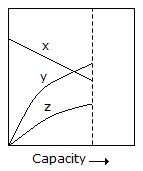Chemical Engineering :: Fluid Mechanics
-
Which of the following is an undesirable property of a manometric liquid ?
-
Characteristic curves for a centrifugal pump plotted against its capacity is shown in the diagram. x, y and z denote respectively

-
Liquid delivery by centrifugal pump starts, only when the head developed by it is equal to the __________ head.
-
The speed of sound in an ideal gas varies as the
-
The maximum head that can be developed by a single impeller is __________ ft.
-
The ratio of hydrodynamic boundary layer to thermal boundary layer thickness in case of liquid metals is
-
The general relationship between speed N, head H, power P and discharge Q for a centrifugal pump is
-
What is the ratio of the velocity at the axis of the pipe to the mean velocity of flow in case of pipe flow under viscous condition ?
-
Foot valve provided in the pump is a __________ valve.
-
The discharge co-efficient for an orificemeter does not depend upon the


 Whatsapp
Whatsapp
 Facebook
Facebook

